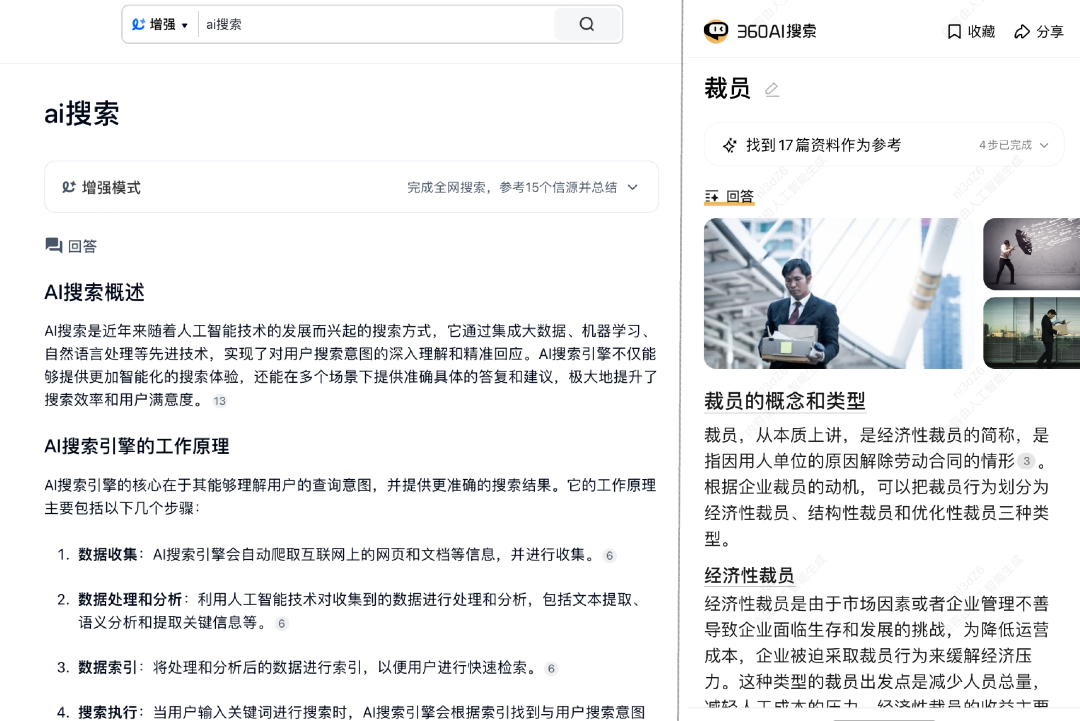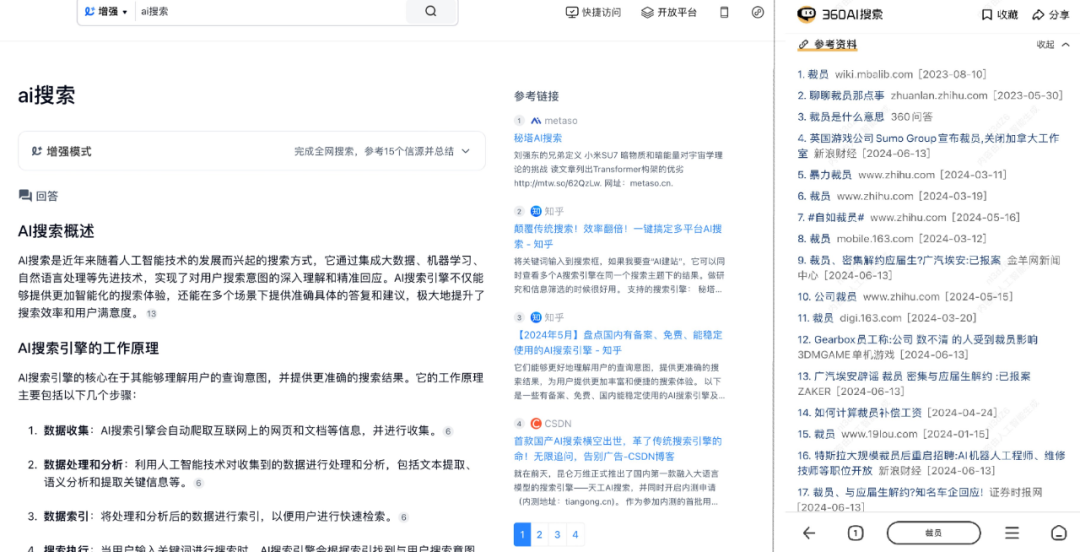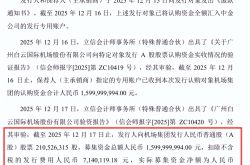Entering the Blue Ocean Era of AI Search: Who Are the New Players?
![]() 06/21 2024
06/21 2024
![]() 528
528

With new players entering the field and some veterans exiting, the battleground that was once dominated by traditional search engines like Baidu, 360, Google, and Quark is seeing a surge of new players who, empowered by AI, see a new possibility for search business development and monetization, uncovering another blue ocean market.
Author | Si Hang
Editor | Pi Ye
Produced by | Industrialist
What does the search engine we have been using actually look like?
According to a Microsoft survey, people use search engines nearly over a billion times daily, covering a wide range of topics, from astronomy to geography, humanities to cyberpunk, and more. However, among these queries, approximately half do not have answers.
Stimulating people's joy of exploration and creative power, as well as harnessing the world's knowledge, has been the mission entrusted to search engines for a long time. More bluntly, search engines and browsers are our primary gateways to explore the world.
But now, this model is undergoing subtle changes.
In the decades of search engine development, while some issues have been resolved, such as search technology and business models, one problem has consistently plagued search engine giants at home and abroad: "Not all questions have answers."
As far as they are concerned, the questions people ask are not those "customized" during the search engine design process. In other words, technical personnel cannot anticipate and input all the questions people will ask into the search engine.
Search engines can only answer some simple questions, such as 2+2=4; finding web pages is also their strength. But for complex question answering and task handling, they struggle.
Today, the emergence of large AI models represents a new imagination for search engines. This is why Microsoft and Google are competing to launch AI search. In fact, the exploration of natural language in the search engine field began in the early 21st century. However, limited by the development of artificial intelligence at that time, no platform or technology emerged that could achieve a breakthrough in understanding natural language.
So, standing at the cusp of the current large model and AIGC application explosion, what imagination can AI bring to search engines? In China, what does the new search form mean for Baidu, 360, Tiangong, and other players? And from a business model perspective, is the traditional search's inherent advertising form being impacted?
These changes are taking place. To some extent, it is not only a change in the form of search itself but also a mirror, reflecting a new ranking battle behind the corresponding business models and entrants.
I. From "trendsetters" to "icebreakers," there are two waves of people
"In the future, with the development of voice recognition technology, the search experience can completely detach from the search box." As early as 2018, Wu Haifeng, the former vice president of Baidu, published an article in the media and explained the future of AI search from three perspectives: "frameless, boundless, and infinite."
Voice recognition technology also happened to make a breakthrough in that year. That year, Baidu launched the Xiaodu smart speaker with voice recognition and interactive functions; it was also at that year's World Artificial Intelligence Conference that attempts were made to use machines to complete simultaneous interpretation, with Tencent and iFLYTEK providing the technology.
Since then, various smart devices have emerged in an endless stream, with their types and functions constantly being innovated. Everyone is studying how to make their own smart devices understand human speech better, and in this process, domestic voice recognition technology has made even more rapid progress.
This aligns with Wu Haifeng's viewpoint back then: "Boundlessness emphasizes no boundaries, and any smart device can be accessed through the 'search entrance.'" Standing at that time, it corresponds to a larger future of AI search, namely, completing the input and output of traditional search engines through natural language.
Sounds like what AIGC applications like ERNIE Bot, Tongyi Qianwen, and kimi are doing today. The difference is that AIGC focuses on "creation" or "creativity," while search requires absolute precision.
From 2018 to the present, in the past six years, countless smart devices have tried to use natural language to complete searches, and they have all achieved applications and implementations in various scenarios, such as various AI assistants in car cabins, smart homes, and even fully intelligent AI appliances.
From the perspective of promoting the development of voice recognition technology, they can all be considered "trendsetters" in AI search.
It can be said that the two are mutually reinforcing. Smart devices promote the development of voice recognition technology, and conversely, advances in natural language processing and speech recognition technology are also driving the development of smart devices. For example, at Baidu's recent Developer Conference, Robin Li demonstrated Xiaodu, and from its intelligence level, it is evident that today's Xiaodu is different from its previous version. This is Xiaodu reconstructed with a large model.
At the same time, it is also Baidu's attempt in AI search. On the software side, internet vendors have embedded AI search into almost every mobile terminal, attempting to reconstruct search engines by changing people's search habits. Among the most typical attempts are WeChat, which can almost replace search engines, and Baidu Wenku, which can be considered a second "encyclopedia."
However, after the arrival of AI, some small changes have occurred in the search market, which was considered "already settled" at the beginning of 2024.
For many years, Google has been the dominant player in the global search engine market, with a market share of around 90%, leaving the remaining 10% to be divided among other search engines such as Microsoft Bing. However, by early 2024, according to the latest data from StatCounter, Microsoft's market share in the United States increased by 1.52%, while Google's decreased by 1.5%.
This data covers the period from February 2023 to January 2024. Just one year earlier, in February 2023, Microsoft's CEO announced that its search engine Bing officially integrated ChatGPT.
A question then arises: In the era of large models, will AI change the market landscape of search engines? If so, how?
In 2023, an overseas AI search startup, just one year after its establishment, secured two significant rounds of funding, reaching a valuation of $500 million, almost shaking the position of Google as a search engine giant.
According to Similarweb data, as of October 25, 2023, the weekly website visits of this search engine increased from 2.75 million to 11.13 million, a threefold increase; by February of this year, its user base even reached 50 million.
This is Perplexity, which was popular last year. Its founding team includes former OpenAI researchers, Meta research scientists, and Perplexity's chief technology officer.
So, how did Perplexity, a pure technology startup with no search-related background, achieve this feat?
First, regarding its lack of search-related background, Perplexity cleverly chose to directly call the APIs of search engines like Google and Microsoft Bing, essentially "seeing" the world from the shoulders of giants, which also ensures the real-time nature of searches.
On the other hand, this is a significant issue that AI search needs to overcome, namely, the hallucination problem. To address this, Perplexity employs RAG technology (retrieval-augmented generation), allowing AI search to find answers in designated "knowledge bases" based on specific questions, thus ensuring its accuracy.
In early 2024, a Chinese version of Perplexity also emerged. Its popularity is no less than that of Perplexity, attracting millions of visits in less than two months. According to Similarweb data, as of March 24, 2024, the search website received 7.793 million visits.
This is Mita Technology, founded by Min Kerui, the former chief scientist of Cheetah Mobile, in 2018. However, unlike Perplexity, Mita's founding team includes talents from both Google and Microsoft.
However, in China, the "icebreaker" is not Mita Technology, which模仿Perplexity, but Kunlun Wanwei, which launched Tiangong AI search in August 2023.
In addition, at the beginning of 2024, 360, a search engine giant that once rivaled Baidu, also launched AI search and released its mobile app in app stores. China's largest search giant, Baidu, has embedded AI search into Baidu Search, Baidu Wenku, and all products, including Xiaodu.
And how will these different entry methods generate "chain reactions"?
II. From Browser to Interaction Box: The Surprises and Shortcomings of Search
Today, two camps have emerged in the domestic search market. One camp, led by 360 and Kunlun Wanwei, has launched independent "AI search" applications; the other camp, led by Baidu, has embedded its GPT capabilities.
Taking 360 and Kunlun Wanwei, which have already launched "AI search" applications, as examples.

Note: Tiangong AI (left), 360 AI Search (right)
As can be seen, both 360 AI Search and Tiangong AI provide complete and systematic textual answers after inputting keywords. Summarization is also a strength of large models. In addition, AI search empowered by large model technology has effectively overcome the long-standing弊病of traditional search, namely, generating too many web pages that often overwhelm users.
In traditional search, after users enter keywords for search, they are presented with thousands of answers, and even more cumbersome is that these answers come from hundreds of web pages. Users need to open each web page to find the answer, easily falling into an "information cocoon."

Note: Tiangong AI (left), 360 AI Search (right)
From the currently launched AI searches, both Tiangong AI and 360 AI Search present relevant web pages in the form of "reference materials" or "reference links."
If traditional search engines are based on the "query" logic to match answers for users from massive internet content, their underlying architecture is "crawler + index + query." AI search, on the other hand, adds generative search and multimodal search, utilizing the inductive and reasoning abilities of large models to generate answers.
Regarding AI search, Zhou Hongyi, the founder of 360, also mentioned on his social media account WeChat Video that one aspect AI search needs to break through is: Today's large models have high accuracy requirements for prompts, but if placed in AI search, this precision requirement becomes very counterintuitive. How to transform prompt keywords from an accurate sentence into several generalized keywords is precisely the issue that "AI search" needs to address.
Judging from the performance of Tiangong AI and 360 AI Search mentioned above, it is evident that achieving this breakthrough is not a difficult task for "AI search."
But if we look at the essence of search, "stimulating people to feel the joy of exploration and creative power, and harnessing world knowledge" has been the mission entrusted to search engines for a long time.
However, only 16-17 relevant web pages limit the imagination space and do not stimulate people's desire to explore. Judging solely from the answers generated by AI search, the "standard answers" they provide may not be what users expect. Some complex questions that traditional search engines could not answer in the past may not be answered by current AI search.
And from a business model perspective, providing only a dozen web links also prevents "AI search" from continuing the traditional search engine's business model.
Various technical issues and business model challenges indicate that AI search is not yet mature.
This is why the current search giants Google, Microsoft, and Baidu have chosen to enter the market in an embedded manner, with no changes to the entry point. At the recent Google I/O conference, Google announced the launch of AI Overviews, an AI search service, allowing users to choose whether to have AI generate answers.
However, regarding the maturity of AI search, Google CEO Sundar Pichai also publicly stated: "The role of search is to provide users with more contextual information, allowing them to explore more deeply, and inaccuracies or errors in answers are areas we need to continuously improve."
If we set aside the current issues with AI search, the greater imagination that large models give to "search" is to complete individual data loops, complementing the biggest shortcoming of traditional search engines—scenarios.
Traditional search engines like Google and Baidu do not lack algorithms, computing power, and data, but for the development of AI and further commercialization, scenarios are just as important as the first three.
In an interview with Tencent Technology, Wang Huainan, the former CMO of Google Asia, reflected that Google also has many problems. For example, it lacks a data loop. Google knows what web pages users clicked on but does not know what they specifically did. In other words, Google cannot track a complete line. But large models can.
The process of users asking questions to large models is also a process of self-learning for large models. In this way, everything users do on AIGC applications and AI search can be tracked by large models. This business loop, in turn, brings faster growth to large models.
And if large models can feed back more scenarios to AI search, then medium-sized companies that have already gathered algorithms, computing power, data, and scenarios face even greater business opportunities.
It is worth mentioning that in addition to medium-sized companies, the emerging AI startups are also a force that cannot be ignored. Taking OpenAI as an example, as a startup, it does not have sufficient data on its own. But Microsoft, which backs OpenAI, does. Similarly, domestic companies like Zhipu Technology and Baichuan Intelligence also have a group of internet giants behind them.
At the same time, this means that the future "star companies" in AI search may not necessarily emerge from today's traditional search giants but from new AI startups.
But a question worth pondering is: will traditional search giants allow such a situation to occur?
III. Search, a New Ranking Battle Behind the Changes
"Most AI applications are currently mainly in search," said a relevant person in charge from Tencent Yuanbao. "Even in terms of proportion, this function accounts for almost over 70%."
This data is further confirmed through communication with relevant enterprises such as ByteDance Doubao, kimi, Alibaba Tongyi Qianwen, and Zhipu Qingyu.
From a certain perspective, search is the primary form of AI large models in the C-end market today. Although there are endless intelligent applications and new gameplay, search based on the main interaction box remains the primary choice for C-end users. Compared to the previous question-and-answer format, people can now obtain more logical and complete answers based on large models, which traditional search engines lacked.
However, from the different models of various companies, this search also carries a certain degree of specificity and enterprise nature. For example, Tencent Yuanbao's search mainly cites public articles as information sources, while ERNIE Bot and Tiangong are based on Baidu's open data. For Doubao, its larger data pool comes from text and video corpora from the ByteDance product system, and the uncertainty of these data sources also constitutes differences in people's questions based on AI search.
Or perhaps we can say that behind the search function, it is more like a mirror reflecting the past product matrix and underlying accumulation of Chinese enterprises. The presentation form, logical approach to answering questions, and citation sources correspond precisely to the company's chassis over the past many years.
And if we look deeper, although AI-based search has not yet become mainstream, including traditional companies like Baidu and 360 that have also integrated their copilot into their own products, it can be perceived that the search function is still becoming more civilian and inclusive.
If in the past two to three decades, the entry ticket for search had to be a browser (PC or mobile), today, this entry ticket is no longer limited in form. Behind the interaction box model,





